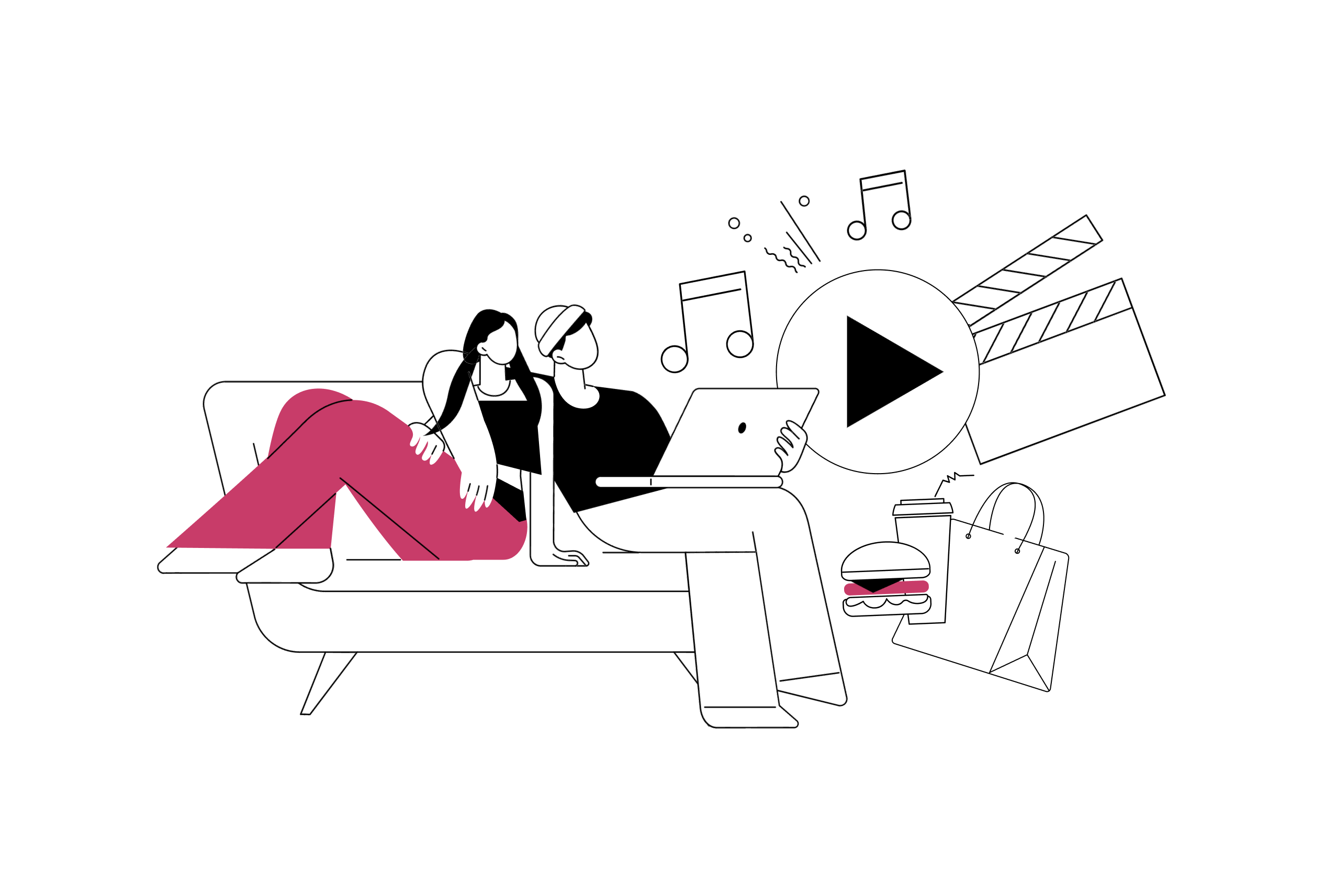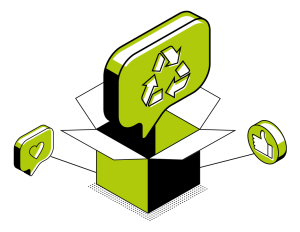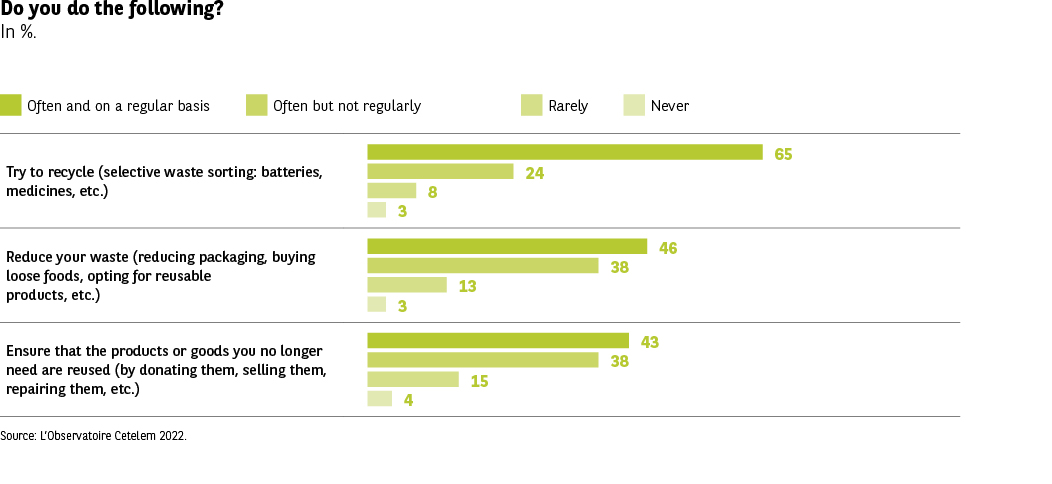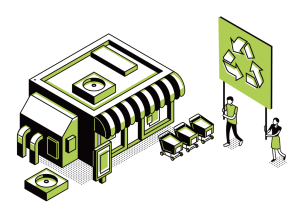Established and increasingly widespread practices


An A+ grade for the 3Rs

So the term circular economy combines two words that resonate positively with Europeans, especially when its semiotic boundaries are clearly defined. Better still, without necessarily being aware of the fact, they are resolutely engaged in applying the three Rs on which the principle relies: Recycle, Reduce, Reuse.
Again, a fairly clear geographical divide can be observed between the Western and Northern countries, on the one hand, and the Eastern nations, on the other. But there is also a generational divide, even if it is less pronounced, with the over-50s generally appearing more committed, irrespective of the R in question.
Waste sorting and recycling in general are the most widespread examples of the practices applied by Europeans (Fig. 4). More than 6 out of 10 Europeans do so regularly, with the Italians topping the list, closely followed by the Austrians, the Spanish and the Swedes. In contrast, the Bulgarians are by far the least diligent in this respect.
Fig. 4 Frequency of Environmental Actions
Download this infographic for your presentations The infographic presents the responses to the question: “Do you take actions that allow you to…?” Units: percentage (%). Four response modalities: • Often and regularly, • Often but irregularly, • Rarely, • Never.
The graphical elements (colored bars) serve to visualize the values and are not decorative.
Source indicated: L’Observatoire Cetelem 2022.
⸻
Key Visual Elements
Each environmental action is displayed in the form of a horizontal bar segmented according to the four response frequencies. The icons on the right are decorative and do not carry any information.
Three actions are evaluated:
1. Favoring recycling (selective sorting: batteries, medications…).
2. Reducing waste (limiting packaging, buying in bulk, prioritizing reusable products…).
3. Reusing or giving away products or goods that are no longer used.
⸻
Data Transcription
1. Favoring recycling • Often and regularly: 65% • Often but irregularly: 24% • Rarely: 8% • Never: 3%
2. Reducing waste • Often and regularly: 46% • Often but irregularly: 38% • Rarely: 13% • Never: 3%
3. Reusing or giving away goods • Often and regularly: 43% • Often but irregularly: 38% • Rarely: 15% • Never: 4%
⸻
Main Lesson (without causal interpretation)
The infographic shows that recycling is the most regularly performed action. The other two actions — reducing waste and reusing/giving away goods — are also frequent, but to a slightly lesser extent for regular practice.
The infographic presents the responses to the question: “Do you take actions that allow you to…?” Units: percentage (%). Four response modalities: • Often and regularly, • Often but irregularly, • Rarely, • Never.
The graphical elements (colored bars) serve to visualize the values and are not decorative.
Source indicated: L’Observatoire Cetelem 2022.
⸻
Key Visual Elements
Each environmental action is displayed in the form of a horizontal bar segmented according to the four response frequencies. The icons on the right are decorative and do not carry any information.
Three actions are evaluated:
1. Favoring recycling (selective sorting: batteries, medications…).
2. Reducing waste (limiting packaging, buying in bulk, prioritizing reusable products…).
3. Reusing or giving away products or goods that are no longer used.
⸻
Data Transcription
1. Favoring recycling • Often and regularly: 65% • Often but irregularly: 24% • Rarely: 8% • Never: 3%
2. Reducing waste • Often and regularly: 46% • Often but irregularly: 38% • Rarely: 13% • Never: 3%
3. Reusing or giving away goods • Often and regularly: 43% • Often but irregularly: 38% • Rarely: 15% • Never: 4%
⸻
Main Lesson (without causal interpretation)
The infographic shows that recycling is the most regularly performed action. The other two actions — reducing waste and reusing/giving away goods — are also frequent, but to a slightly lesser extent for regular practice.

Waste reduction is also commonly practised. 46% of Europeans state that they have tried to cut down. And once again, the Italians prove to be the most virtuous when it comes to this aspect of the circular economy. This time around, the Czechs are the least committed.
The third R, the re-use of products, either through their sale, donation or repurposing, is regularly performed by 43% of Europeans. Once more, the Italians and the Czechs can be found at the top and at the bottom of the international ranking, respectively.
Practices that are becoming increasingly established over time
While Europeans show a positive attitude to taking part in the circular economy, it is even more encouraging to see that they intend to ramp up their commitment in the future.
Indeed, 1 in 2 Europeans declare that they have recycled more and reduced their waste over the last three years (Fig. 5). This time around, there is little geographical segmentation to speak of. The Italians, Poles, Danes and Romanians lead the way in this area, while the Germans, Bulgarians and Norwegians bring up the rear.
Much like the first two practices, which have been around for longer, the re-use of products has increased substantially over the same period, with 44% of Europeans reporting that they are making greater efforts in this area.
Fig. 5 Evolution of the Frequency of Environmental Actions
Download this infographic for your presentations The infographic presents the responses to the question: “Compared to three years ago, do you do each of the following actions more, less, or about the same frequency?”
Unit: percentage (%).
Three response categories:
• More (green bar),
• Neither more nor less,
• Less.
An icon in the bottom right corner is decorative and does not carry any information.
Source: L’Observatoire Cetelem 2022.
Key Visual Elements
Each action is represented by a horizontal bar segmented according to the three modalities. The order of the categories is: More / Neither more nor less / Less. The descriptive text of the actions is displayed in full in the image.
Data Transcription
1. Favoring recycling
(selective sorting: batteries, medications…)
• More: 49%
• Neither more nor less: 40%
• Less: 11%
2. Reducing waste
(limiting packaging, buying in bulk, prioritizing reusable products, etc.)
• More: 49%
• Neither more nor less: 39%
• Less: 12%
3. Reusing or giving away goods that are no longer used
(by giving them away, reselling them, repairing them, etc.)
• More: 44%
• Neither more nor less: 42%
• Less: 14%
The infographic presents the responses to the question: “Compared to three years ago, do you do each of the following actions more, less, or about the same frequency?”
Unit: percentage (%).
Three response categories:
• More (green bar),
• Neither more nor less,
• Less.
An icon in the bottom right corner is decorative and does not carry any information.
Source: L’Observatoire Cetelem 2022.
Key Visual Elements
Each action is represented by a horizontal bar segmented according to the three modalities. The order of the categories is: More / Neither more nor less / Less. The descriptive text of the actions is displayed in full in the image.
Data Transcription
1. Favoring recycling
(selective sorting: batteries, medications…)
• More: 49%
• Neither more nor less: 40%
• Less: 11%
2. Reducing waste
(limiting packaging, buying in bulk, prioritizing reusable products, etc.)
• More: 49%
• Neither more nor less: 39%
• Less: 12%
3. Reusing or giving away goods that are no longer used
(by giving them away, reselling them, repairing them, etc.)
• More: 44%
• Neither more nor less: 42%
• Less: 14%
